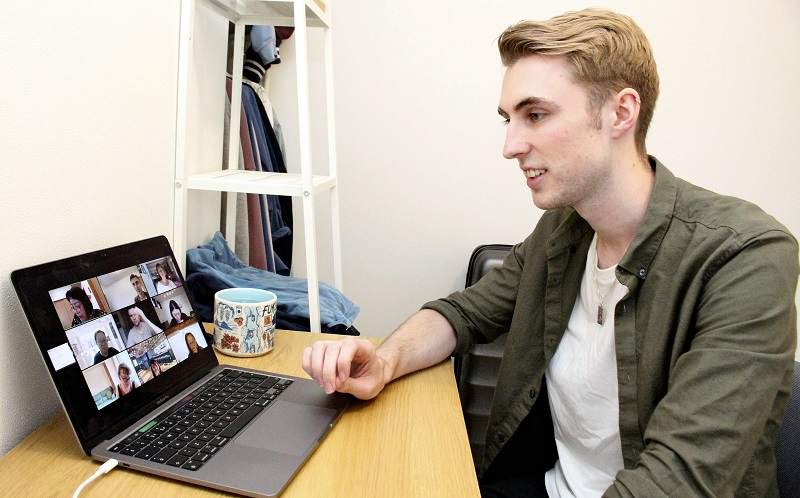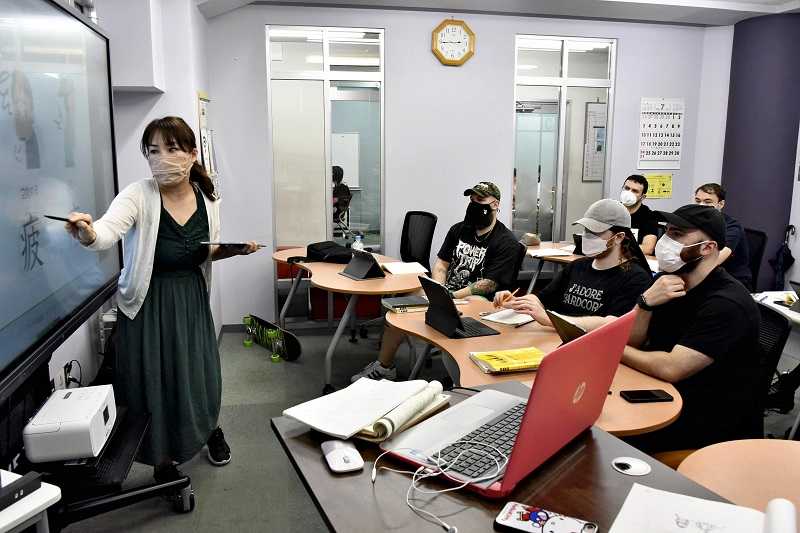Foreign students return / Overseas students finally start new chapter in life

Gregory McDonald remotely takes part in a Japanese-language class from his home in Shibuya Ward, Tokyo, on Aug. 4.
The Yomiuri Shimbun
6:00 JST, August 16, 2022
The recent relaxation of entry restrictions for foreigners opened the door back up for overseas students to learn in Japan. What awaits those who are finally here after a long delay? The Yomiuri Shimbun talked with students at Kai Japanese Language School, an institute in Shinjuku Ward, Tokyo, with students from 40 countries and territories. This is the first of a five-part series.
***
Briton Gregory McDonald landed at Tokyo’s Haneda Airport on March 23. Hearing Japanese spoken all around him was a thrill for the 23-year-old. Near the hotel where he spent the first night he could see rows of cherry trees about to burst in bloom.
It was the start of a new chapter in his life that he had eagerly awaited. He had finally made it.
When McDonald was a child, his father took a business trip to Japan as a management consultant. In the photos his father took, McDonald saw signs with kanji and hiragana characters, and he was intrigued when his father talked about the custom of bowing and other aspects of the country. It was a culture completely different from his own.
Someday I want to live there, he thought. McDonald’s chance to turn the dream into reality came after he graduated from university, when he decided to enroll at Kai Japanese Language School in Tokyo’s Shinjuku Ward. Classes were to start in June 2020.
But then the pandemic stepped in and disrupted his plans. Restrictions on entry into Japan forced him to put his trip on hold. When the restrictions were eased in October that year, he finally obtained a visa, paid the school fees and booked a Dec. 27 flight to Japan.
Then a variant of the coronavirus began spreading across Britain — on Dec. 23, the Japanese government announced a ban on all entries from Britain, starting the following day. McDonald could not get a ticket for a flight leaving on the night of Dec. 23.
The course started in January 2021. While 10 or so classmates were able to physically attend classes, he joined them remotely from Britain. Because of the time difference, the class ran from 4:40 a.m. to 8:30 a.m. British time, forcing him to wake up in the small hours of the night. This routine lasted for a year.
McDonald, whose Japanese-language ability had been limited to writing hiragana and katakana, improved to the point of being able to carry on an everyday conversation. But he felt envious of his classmates, believing he would have made more progress had he been in Japan.
It is now four months since he arrived in March. With Japan in the midst of a seventh wave of infections, his classes are sometimes conducted online. Aug. 4 was one of those days, and during the remote class, the theme of the discussion with classmates was what motivated them to study Japanese.
They pointed out each other’s grammatical errors and mistakes in word usage, which was not so different from the remote classes he took from Britain.
Still, he can try out words and expressions he has learned whenever he wants at restaurants and other places where he spends his days. To him, the time spent in class in Japan is irreplaceable for learning “real Japanese.”
Anxiously waiting
Currently, the school has about 190 students, but that number had dropped to 50 at one point due to the entry restrictions. The school set up an environment that enables students to attend classes from outside Japan, but some students have given up on ever coming to Japan.

Students from various countries sit in a class at Kai Japanese Language School in Shinjuku Ward, Tokyo, in July. The school is regaining its former bustle with the relaxing of entry restrictions on foreign students.
In November 2021, the school opened a chat room for overseas students waiting to come to Japan. Many students voiced confusion and anxiety, posting things like, “Will the chance ever come?” and “I can’t wait forever.”
Concetta De Sio, a 30-year-old Italian who started studying at the school in April, was one such person whose life was in limbo.
During a trip to Tokyo about five years ago, De Sio became fascinated with the fashion of people on the street and by the modern atmosphere. She quit her job as a fashion designer in February 2020 with a plan to come to Japan the following month.
However, the entry restrictions kept her from ever getting on a plane.
When the restrictions were eased in October that year, she applied for a visa, only to see the limits reinstated in December. During the two years it took to finally get to Japan, she made ends meet by working part-time jobs.
She said she would have taken as many PCR tests as she needed to get here, but that never was the issue. She was shut out, to the point where she felt like Japan was rejecting her.
De Sio finally entered Japan in late March and is taking the intermediate-level course at the school. She already plans to return to her job and will stay in Japan until the end of September.
With a goal of being able to speak fluently with Japanese people, she said she wants to improve as much as she can in the limited time she has left here.
Sharp decline
In 2008, the government set a goal, in line with its policy of internationalization, to increase the number of foreign students in Japan to 300,000 by 2020. According to the Japan Student Services Organization, the number reached a record 310,000 in 2019.
However, when the pandemic prompted stiff restrictions on the entry of foreigners in the spring of 2020, more and more students from abroad became unable to come to Japan.
According to the Immigration Services Agency, 510,000 non-Japanese entered or re-entered Japan on a student visa in 2019. That number plunged to 160,000 in 2020 and further to 30,000 in 2021.
The Certificate of Eligibility, which is required when applying for a student visa, was issued in 200,000 cases from 2020 to 2021, but as of Jan. 4 this year, 150,000 have not been used.
Fearing overseas students may abandon plans to come to Japan, a group of Japanese-language schools banded together in May 2021 to help open the door for students from abroad.
Hiroko Yamamoto, the director of Kai Japanese Language School, is among the leaders who spearheaded efforts by the Open the Borders to Safe Study in Japan Association.
The association provided a forum for frustrated prospective students, some of whom said they quit jobs only to find they were unable to enter Japan, or moved out of an apartment because they were heading to Japan. The association pressed the government to ease entry restrictions as soon as possible.
In March, the restrictions on students were relaxed. The government is now looking to reach the pre-pandemic goal of 310,000 foreign students annually by 2027.
Most Read
Popular articles in the past 24 hours
-

Voters Using AI to Choose Candidates in Japan's Upcoming General ...
-

Japan's Snow-Clad Beauty: Camellia Flowers Seen in Winter Bloom a...
-

Monkey Strikes Junior High School Girl from Behind in Japan's Yam...
-

Genichiro Inokuma's Mural in Ueno Station That Gave Hope in Postw...
-

Senior Japanese Citizens Return to University to Gain Knowledge, ...
-

Heavy Snow Linked to 30 Deaths across Japan since Late Jan.; JMA ...
-

Tokyo Police Arrest Head of Resignation Assistance Firm
-

Foreign and Security Policy: Political Parties Must Discuss How T...
Popular articles in the past week
-

Japan Institute to Use Domestic Commercial Optical Lattice Clock ...
-

Australian Woman Dies After Mishap on Ski Lift in Nagano Prefectu...
-

Foreign Snowboarder in Serious Condition After Hanging in Midair ...
-

Chinese Embassy in Japan Reiterates Call for Chinese People to Re...
-

Narita Airport, Startup in Japan Demonstrate Machine to Compress ...
-

Toyota Motor Group Firm to Sell Clean Energy Greenhouses for Stra...
-

Sakie Yokota, Last Surviving Parent of a North Korea Abductee, Ur...
-

Beer Yeast Helps Save Labor, Water Use in Growing Rice; Govt Hope...
Popular articles in the past month
-

Univ. in Japan, Tokyo-Based Startup to Develop Satellite for Disa...
-

JAL, ANA Cancel Flights During 3-day Holiday Weekend due to Blizz...
-

China Confirmed to Be Operating Drilling Vessel Near Japan-China ...
-

China Eyes Rare Earth Foothold in Malaysia to Maintain Dominance,...
-

M6.2 Earthquake Hits Japan's Tottori, Shimane Prefectures; No Tsu...
-

Japan Institute to Use Domestic Commercial Optical Lattice Clock ...
-

Japan, Qatar Ministers Agree on Need for Stable Energy Supplies; ...
-

Japan, Italy to Boost LNG Cooperation; Aimed at Diversifying Japa...
Top Articles in Society
-

JAL, ANA Cancel Flights During 3-day Holiday Weekend due to Blizzard
-

Record-Breaking Snow Cripples Public Transport in Hokkaido; 7,000 People Stay Overnight at New Chitose Airport
-

Australian Woman Dies After Mishap on Ski Lift in Nagano Prefecture
-

Foreign Snowboarder in Serious Condition After Hanging in Midair from Chairlift in Nagano Prefecture
-

Train Services in Tokyo Resume Following Power Outage That Suspended Yamanote, Keihin-Tohoku Lines (Update 4)
JN ACCESS RANKING
-

Univ. in Japan, Tokyo-Based Startup to Develop Satellite for Disaster Prevention Measures, Bears
-

JAL, ANA Cancel Flights During 3-day Holiday Weekend due to Blizzard
-

China Confirmed to Be Operating Drilling Vessel Near Japan-China Median Line
-

China Eyes Rare Earth Foothold in Malaysia to Maintain Dominance, Counter Japan, U.S.
-

Japan Institute to Use Domestic Commercial Optical Lattice Clock to Set Japan Standard Time







